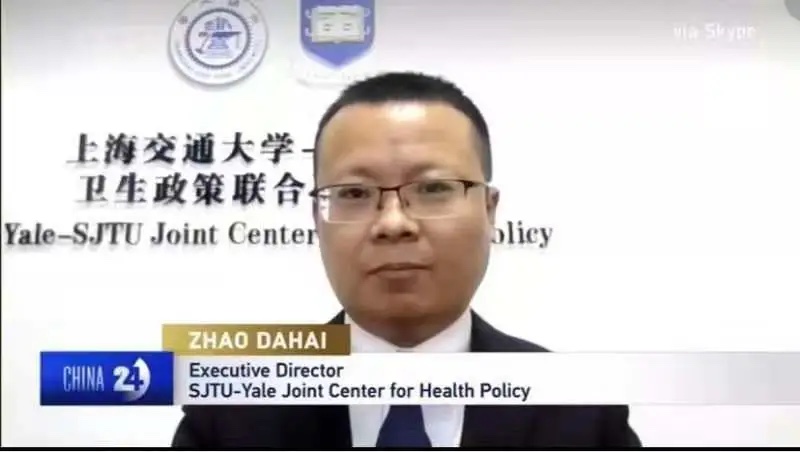上海交大赵大海接受央视专访:河北新冠局部暴发警示健全新冠早期监测机制的重大意义
上海交通大学国际与公共事务学院博士生导师、上海交通大学-耶鲁大学卫生政策联合研究中心执行主任赵大海,自新冠肺炎疫情暴发以来,对于新冠疫情暴发、防控以及卫生政策第50次接受中央电视台专访,也是第77次接受央视、上视专访。2021年1月8日,赵大海在中央电视台英语频道的《中国24小时》节目,就河北新冠疫情局部暴发的相关话题进行了直播访谈。现将访谈内容翻译并摘录如下。

主持人:河北省本地新冠确诊病例多发生在农村地区。您如何来看待这个现象?在这些地区,控制新冠疫情最关键的是什么?
赵大海:考虑到目前我国对新冠疫情的早期监测和应对机制主要针对的是城市地区,河北省的新冠疫情警示我们,各地方政府不能放松对农村潜在新冠疫情暴发的防范。我相信这是一个很好的警示,各地方政府应尽快在农村地区建立起早期疫情监测的机制。控制新冠疫情最关键的是对该地区实施封锁,这些地区的所有人都应该待在家里。进而,对该地区全体居民实施核酸检测。实际上,河北省这些地区对新冠疫情的控制是完全符合上述传统的新冠疫情控制原则的。此外,对该地区核酸检测呈阴性的居民,进行新冠疫苗接种也是另一种备选方案。

主持人:我们看到今年冬天全国各地的新冠感染人数有所回升。更多的新冠感染尚未被发现的可能性有多大?刚才您提到了加强对农村地区的新冠疫情早期监测,那对全国无论城市还是农村而言,如何加强早期监测?
赵大海:我相信发生更多的新冠局部暴发的可能性是相对比较高的。考虑到中国春运即将开启,巨大的人群将在全国范围内流动;这必然会进一步提升发生更多局部新冠疫情暴发的可能性。在新冠疫情早期监测方面,我认为至少四种监测方式需要协同运行。具体而言,对新冠疑似症状和旅行史的居民监测包括以社区、工作场所、公共场所(特别是公共交通场所)和医院为基础的监测。通过上述新冠疫情的早期监测机制的共同运行,以及重点人群的新冠疫苗接种,局部新冠疫情暴发的可能性将会大幅降低。
供稿者:上海交通大学
日期:2021年1月9日
Dahai ZHAO’s Exclusive Interview with CGTN: The local outbreak of COVID-19 in Hebei is of great significance for warning and improving the early surveillance mechanism of COVID-19
Dahai Zhao, a doctoral supervisor at the School of International and Public Affairs of Shanghai Jiao Tong University and Executive Director of Shanghai Jiao Tong University-Yale University Joint Research Center for Health Policy, has been interviewed by CGTN for the 50nd time (the 77nd time by CGTN / ShanghaiTV) since the COVID-19 pandemic. On January 8, 2021, Zhao commented on the local outbreak of COVID-19 in Hebei on “China 24” of CGTN.
Anchor: Most of the confirmed local cases in Hebei province occurred in rural areas. What does this say to you? And what's the most crucial thing in epidemic control in these areas?
ZHAO: Considering the current early monitoring and response mechanism on COVID-19 outbreak in Chinese mainland is mostly for urban areas. The outbreak in Hebei Province tells us that the local government can not relax the guard for the potential outbreak in rural areas. I believe it is a good notice for all local governments to build the early monitoring in rural areas. The most crucial thing in epidemic control is lockdown of the area. All people in the areas should stay at home. Further, the nucleic acid tests are conducted for all people in the area. Actually, what these areas in Hebei Province have done is accordant with the traditional control principle on COVID-19 outbreak. In addition, vaccinating the people in this area who are detected negative through nucleic acid test is another option.
Anchor: We've seen a rebound in infection numbers this winter, scattered around the country. What's the likelihood of more infections yet undetected? How can monitoring be stepped up?
ZHAO: I believe the likelihood of more potential infections occur is relatively high. Considering the Chinese Spring Festival Travel is approaching, a large number of people will travel nationwide. This must further enhance the likelihood of more local outbreaks happen. In terms of the monitoring, I think four types of monitoring may work together. Specifically, the monitoring on suspected symptoms and travel history includes the community in rural and urban areas, workplace, public areas, particularly for public transportations, and hospital-based. Through the operation of early monitoring mechanisms and key population who have been vaccinated, the likelihood of more local outbreaks will be decreased.
Contributor: SIPA, SJTU
Data: January 9, 2021

